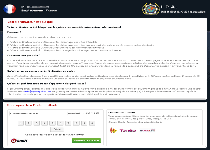TrojanSpy:MSIL/Neos.A
TrojanSpy:MSIL/Neos.A is a dangerous computer infection known to be a Trojan horse. TrojanSpy:MSIL/Neos.A may be used to allow a remote attacker to gain access to the infected system where personal information or other data may be compromised. TrojanSpy:MSIL/Neos.A adds entries to the registry and masks itself as an executable file making it difficult to manually detect and remove. It is very important to utilize methods to automatically detect and remove TrojanSpy:MSIL/Neos.A before it is...
